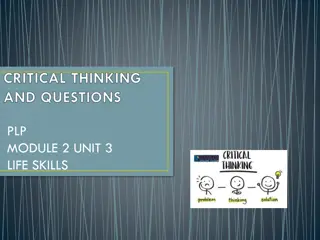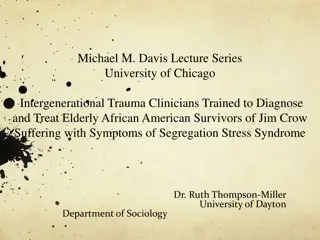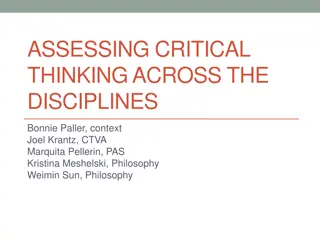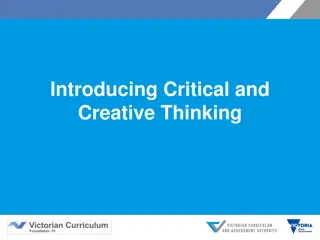Enhancing Coping Skills through Positive Thinking
Explore the power of positive thinking in coping with challenges and improving mental well-being. Learn how to prune negative thoughts, develop positive coping statements, and maintain a healthy positivity-to-negativity ratio for a resilient mindset. Enhance your coping abilities by harnessing the connection between thoughts, emotions, and actions.
Download Presentation

Please find below an Image/Link to download the presentation.
The content on the website is provided AS IS for your information and personal use only. It may not be sold, licensed, or shared on other websites without obtaining consent from the author.If you encounter any issues during the download, it is possible that the publisher has removed the file from their server.
You are allowed to download the files provided on this website for personal or commercial use, subject to the condition that they are used lawfully. All files are the property of their respective owners.
The content on the website is provided AS IS for your information and personal use only. It may not be sold, licensed, or shared on other websites without obtaining consent from the author.
E N D
Presentation Transcript
You become what you think about. Earl Nightingale
Pruning & Proliferation Any good gardener knows that you have to prune back a plant to help it to grow. In the same way, pruning our thoughts is essential to declutter our minds, and let go of thoughts that don t serve us. Your mind is a garden. You can grow flowers or you can grow weeds.
Pruning & Proliferation Instructions: Sometimes negative thoughts can make us feel even worse! Cross off the negative thoughts and colour the positive thoughts. Whatever happens, I can handle it. Nobody cares about me I can t do it. This is hard. I can change my thoughts. What s the point! I am resilient
Positivity/Negativity ratio A ratio of 3 to 1 or higher leads to a clearer sense of wellbeing. 3 The ratio is a tipping point spiralling up vs spiralling down. 1 Top Tip: If you find yourself focusing on negatives, counter this by identifying and writing down three positive things (e.g. what went well today, things you are grateful for, things I am looking forward to.)
Coping Thoughts Coping is a process and THINKING is one of the best tools we have to cope. There are things that happen that are outside of our control. What we can control is how we respond. There is a strong connection between what we think, what we feel and what we do.
Coping Thoughts Positive coping thoughts encourage us and help us cope through distressing times. We can say these encouraging statements to ourselves. Like any skill, the more you practice your coping statements, the more quickly they will become part of your automatic thought processes.
Examples of coping statements I can be anxious/angry/sad and still deal with this. It s okay to feel thisway, it s a normal reaction. I can feel bad and still choose to take a new and healthy direction. My thoughts don t control my life, I do. This situation sucks, but it won t last forever. I can think different thoughts if I want to. By staying present and focused on my task my anxiety will decrease. Don t discount the positives I m stronger than I think. I am the type of person who does difficult things. Right now, I am not in danger. Right now, I m safe. I am strong and I can deal with it. I am not alone. I ve survived before, I will survive now. I am safe. This feeling isn t comfortable, but I can handle it. Step by step until it s over. Feeling tense is natural. It tells me it s time to use coping strategies. STOP! These thoughts are not good for me. Worry doesn t help. Fighting this doesn t help so I ll just relax and breathe deeply and let it float away. I am going to breathe slowly until I know what to do. Anxiety is a old habit pattern that my body responds to. I am going to calmly and slowly change this old habit. I am more capable that I give myself credit for.
Activity: Coping Thoughts Try and come up with some phrases which remind you: My coping phrases: This is a difficult moment. You are not alone, other people are struggling too Be kind to yourself Now practice using the coping phrases you have come up with!



























